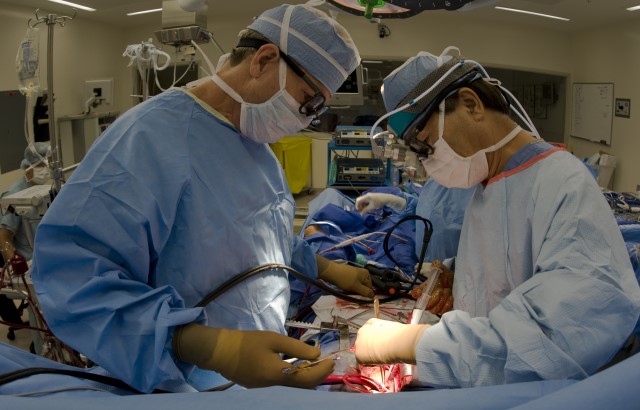

A new heart valve with potentially greater benefits than current artificial valves has been developed by scientists at Bristol and Cambridge, thanks to research we have funded.

The latest results of the PoliValve, which could be tested in patients within five years, have been published today in Biomaterials Science - a high-impact journal from the Royal Society of Chemistry.
Artificial valves
Heart valve disease is estimated to affect as many as 1.5 million people in the UK, with thousands of valve replacement surgeries carried out each year.
There are currently two types of artificial replacement valves available – either a tissue or a mechanical valve. Although both have many benefits, they also have their limitations.
People fitted with a mechanical valve must take lifelong blood thinning drugs, whereas tissue valves are not as durable and usually need replacing later in life.
Resembling a natural heart valve
The PoliValve has been created by Professor Geoff Moggridge, Dr Marta Serrani and Dr Joanna Stasiak at the University of Cambridge and Professor Raimondo Ascione at the University of Bristol, building on earlier work with Professor Costantino’s group at Politecnico di Milano.
The valve is made from a special material and is designed to resemble the flexibility, behaviour and durability of a natural heart valve.

Initial testing in a small pilot study of sheep at the University of Bristol’s Translational Biomedical Research Centre has shown promising results. In the study, the valve was shown to be easy to stitch in and had no signs of mechanical failure at one to 24 hours after surgery.
Replacement heart valves are also subject to International Organisation for Standardisation (ISO) standards, which stipulates that they must last 200 million heartbeats – about five years. In the study, the PoliValve was shown to comfortably surpass this, with durability in excess of 1.2 billion cycles, equivalent to 30 years.
Further research will now need to be carried out before bringing this new treatment to patients.
Promising development
Our Medical Director, Professor Sir Nilesh Samani, said: “Patients requiring an artificial heart valve are often faced with the dilemma of choosing between a metallic or tissue valve replacement.
“A metallic valve is long lasting but requires the patient to take lifelong blood thinning drugs. Although this medication prevents clots forming on the valve, it also increases the risk of serious bleeding.
“Patients who have a tissue valve replacement usually don’t need to take this medication. However, the valve is less durable and means the patient may face further surgery.
“The polymer valve combines the benefits of both – it is durable and would not require the need for blood thinning drugs. While further testing is needed before this valve can be used in patients, this is a promising development, and the BHF is pleased to have supported this research.”
The study also includes a team of co-authors, Dr James Taylor from the Whittle Laboratory; a team at Newcastle University headed by Professor Zaman; Professor Saadeh Sulaiman at the University of Bristol and Professor Costantino’s group at Politecnico di Milano.


